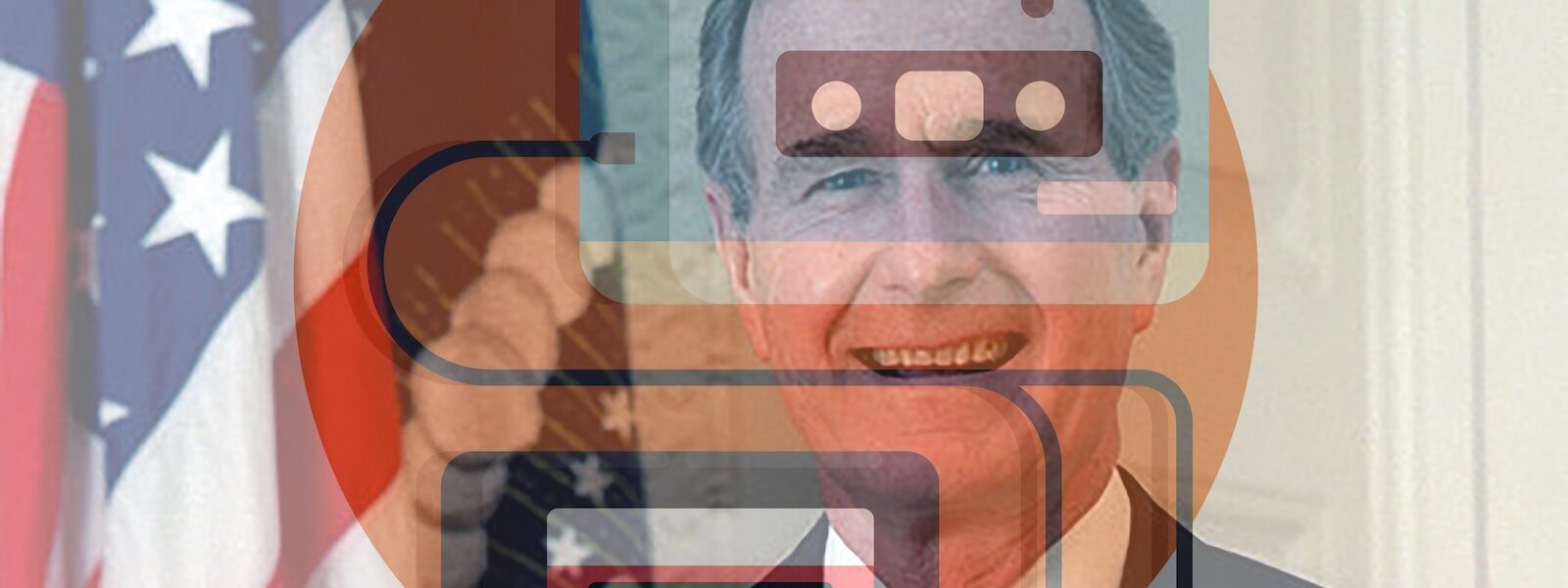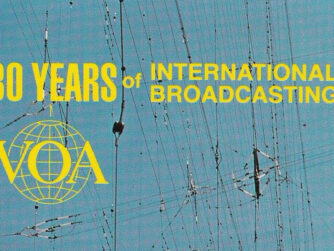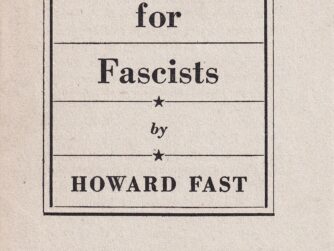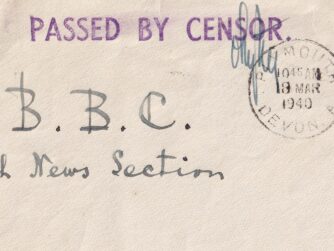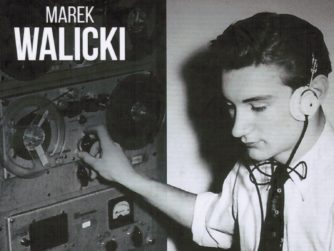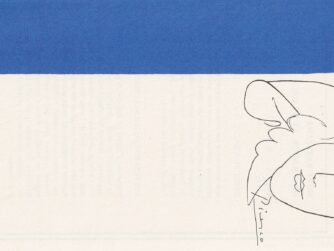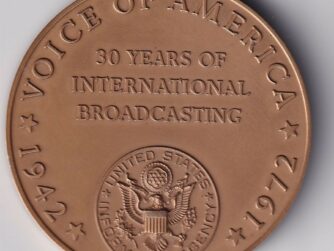Ted Lipien for Cold War Radio Museum
On Sunday, September 27, 1987, Vice President and future U.S. President George H. W. Bush, who visited Poland at the request of President Ronald Reagan, took part with his wife, Barbara Bush, and the American delegation in a Catholic mass in the St. Margaret church in Łomianki, a small town near Warsaw. A few days before Bush’s departure for his trip to Poland, the Polish People’s Republic Embassy in Washington granted me a journalist’s visa, and I could travel with other American reporters covering the vice-presidential visit. Voice of America’s (VOA) Polish Service broadcast my reports and interviews transmitted to Washington by phone from private apartments, where telephone lines were less likely to be cut or jammed by the communist secret police. VOA’s Polish Service did not broadcast live or later the entire religious service in Łomianki with the participation of Vice President Bush, but long segments of recordings I made during the mass were included in my reports broadcast back to Poland from Washington on the same day.
The government media of the Polish People’s Republic covered the visit but did not provide detailed information about Vice President’s meetings with opposition leaders and Solidarity advisers supported by the church hierarchy in Poland. Millions of Poles followed the course of the visit, listening to the broadcasts of the Voice of America and the Polish Service of Radio Free Europe (RFE). Radio Free Europe had to rely on its network of secret correspondents in Poland because the authorities of the Polish People’s Republic refused to issue visas to its journalists working in Munich. In general, RFE provided much more extensive coverage of events in Poland than the Voice of America throughout the Cold War, but at least during this visit by the U.S. vice president, VOA was in a better position to report on it thanks to having its own correspondent close to the official visitor from the United States.
Recordings of Vice President George H. W. Bush’s speeches (in English with Polish translation) in Łomianki and Kiełpin, Poland, September 27, 1987. These recordings are in the Cold War Radio Museum’s collection.
Visit to the tomb of a murdered priest
President Reagan and George Bush understood the critical role of Pope John Paul II, a former Archbishop of Kraków, and role of the Catholic Church in sustaining the nonviolent struggle for freedom and democracy in Poland. John Paul II and Polish bishops firmly believed that any political transformation in their country must be nonviolent. The Polish pope admired Matin Luther King Jr. for his peaceful struggle for civil rights in the United States and Mahatma Gandhi for his advocacy of nonviolence in winning India’s independence from England. The only acts of serious violence in Poland during the Solidarity period were committed by the communist secret police, whose officers beat up and sometimes killed workers, students, intellectuals, and priests involved in pro-democracy activities.
Participation in a Sunday mass in Łomianki and laying of flowers at St. Stanislaus Kostka Church, Warsaw, in Warsaw on the grave of Fr. Jerzy Popiełuszko, a chaplain in the Solidarity trade union murdered by security service officers in 1984, were important points of George Bush’s visit, as were his meetings with the leader of Solidarity Lech Wałęsa and other opposition activists. He also met in Warsaw with the Primate of Poland, Józef Glemp, and several days earlier, he talked with Pope John Paul II, the former Archbishop of Kraków, during the pontiff’s visit to the United States.
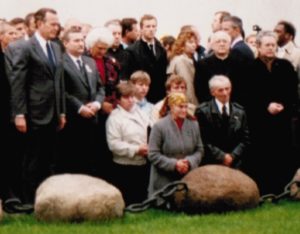
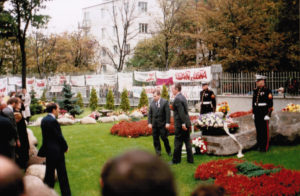
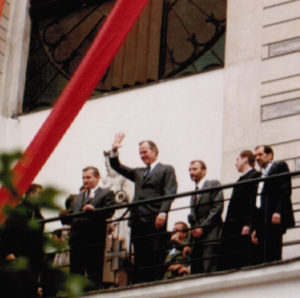
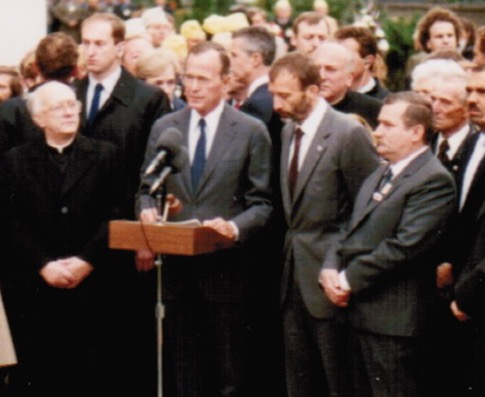
Vice President George H. W. Bush and Solidarity leader Lech Wałęsa at the tomb of Father Jerzy Popiełuszko in Warsaw, September 28, 1987. Father Popiełuszko was kidnapped, tortured, and murdered by officers of Poland’s communist secret police. (Photos by Voice of America reporter and Polish Service chief Ted (Tadeusz) Lipien)
Views on religious programming at Voice of America
Knowing that religion and the Polish pope played a crucial role in sustaining the resistance of the people in Poland to Communism and the Soviet Union, the Reagan-Bush administration allowed the Voice of America, the U.S. government radio station, to increase reporting about religion behind the Iron Curtain. VOA’s Polish Service took advantage of their strong support for foreign language U.S. broadcasting to the Soviet Bloc and the enhanced funding and opportunities to produce programming dealing with religion.
On the other hand, some longtime Voice of America managers and the VOA English newsroom editors and reporters were generally critical of these changes and Reagan’s policy toward the Soviet Union and other communist-ruled countries. For many of them, programs focused on U.S. and international news reporting without being too critical of Communism or trying to counter Soviet propaganda represented a purer form of objective journalism. They also wanted to protect their jobs by insisting that VOA’s foreign language services translate centrally-produced programs written by them in English. Many thought that American jazz, and other cultural and public diplomacy outreach initiatives abroad were more effective in dealing with the Soviet Russia and her communist allies. While not being opposed to all reporting on religious matters, many VOA managers before Reagan did not think that radio audiences in Eastern Europe necessarily needed more religious programs from the Voice of America.
Managers in charge of the Voice of America, who would soon be reassigned by Reagan administration appointees, were not ashamed but rather proud to state in an promotional brochure published by the International Communications Agency (the United States Information Agency was renamed the International Communication Agency during the Carter administration but the Reagan administration changed it back to the original name):
When the [Voice of America] news is broadcast, listeners in Poland hear essentially the same program as those in Brazil or Pakistan, except that they hear it in their own language.1
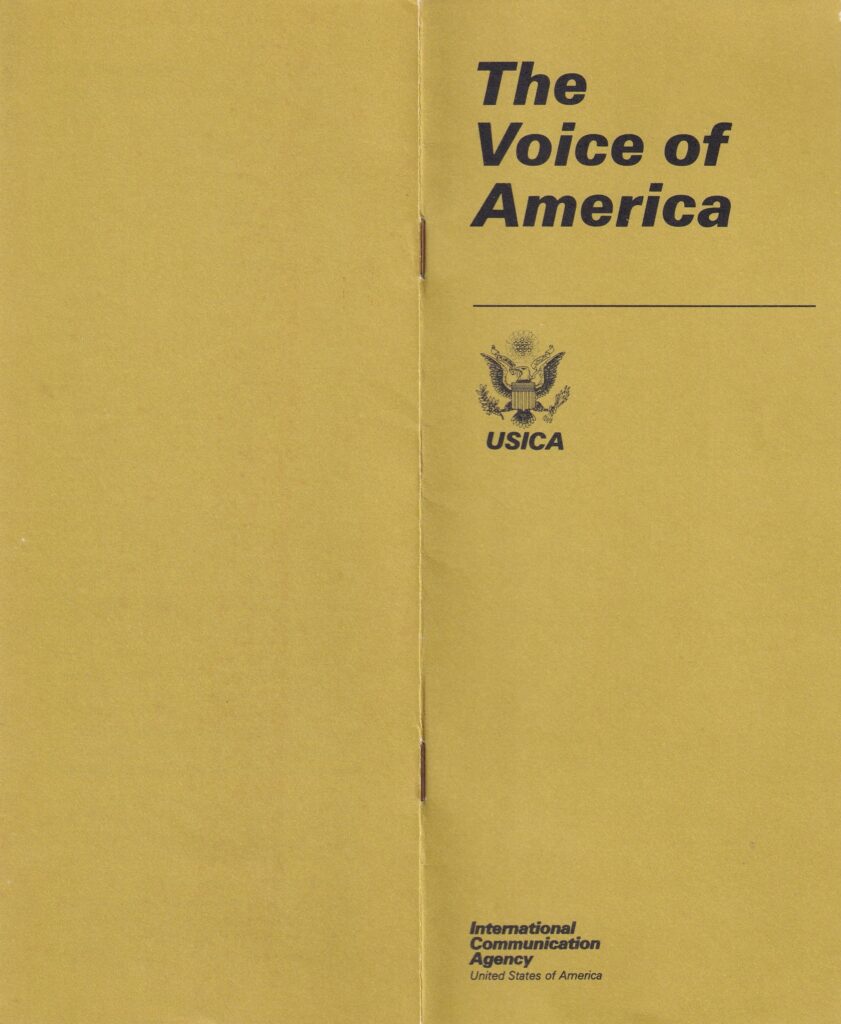
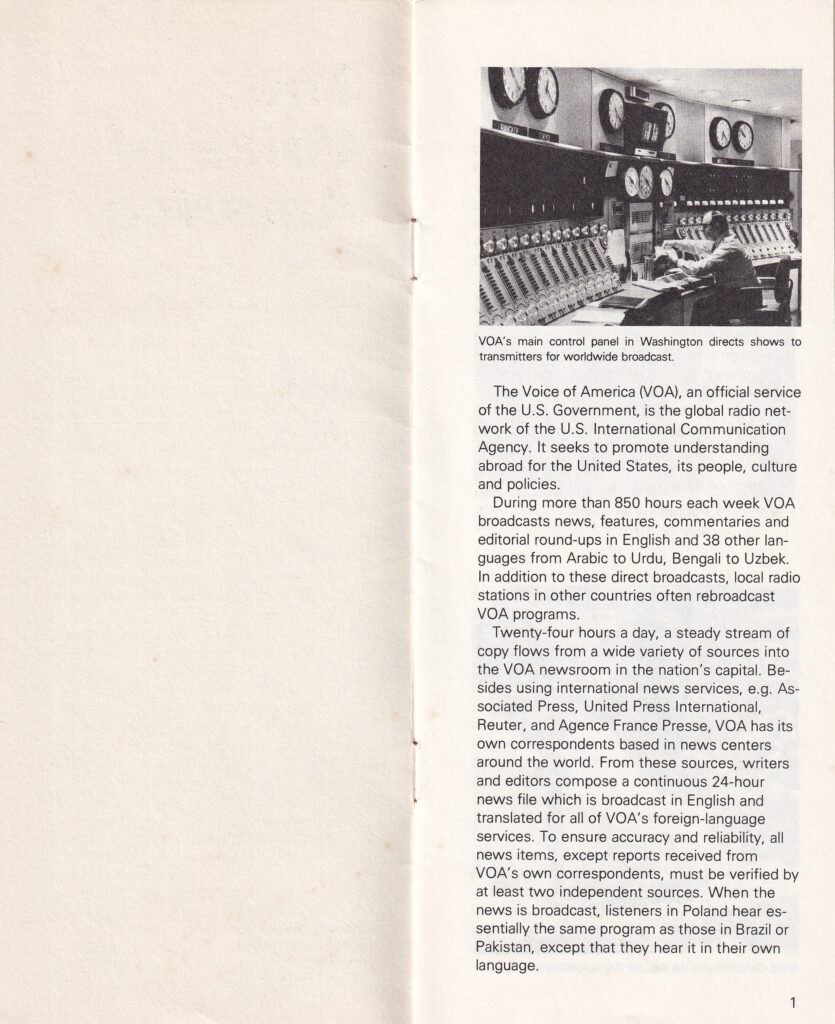
International Communication Agency’s promotional brochure, “The Voice of America.”
New York Times on John Paul II’s first visit as pope to Poland
Some of pre-Reagan VOA managers’ colleagues working for private media in the United States also underestimated the power of religion and did not foresee that Pope John Paul II could undermine the communist system in Poland or in the rest of the Soviet empire. When Karol Wojtyła visited his homeland for the first time as pope, the New York Times firmly expressed its view in its editorial on June 5, 1979 that Communism was not being threatened by the papal visit.
The speeches of John Paul II call for greater freedom for the church, for greater opportunity to educate the Polish young and for greater church participation in determining Poland’s future. But these are far less than a summons to end Communist rule or to break with Moscow. As much as the visit of Pope John Paul II must reinvigorate and reinspire the Roman Catholic Church in Poland, it does not threaten the political order of the nation or of Eastern Europe.2
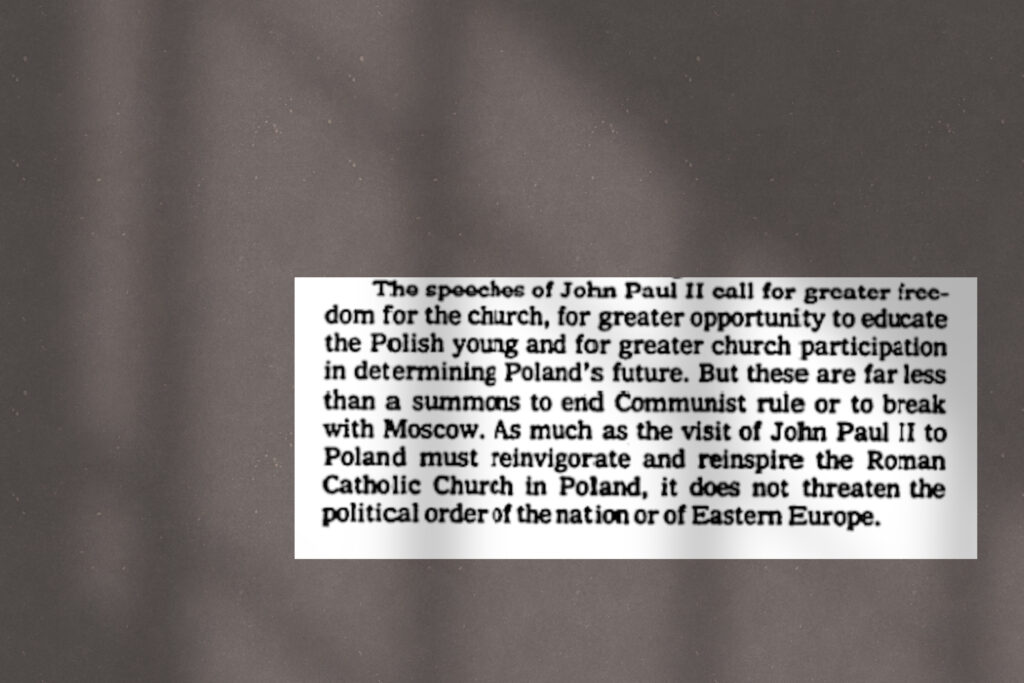
Quote from a New York Times editorial, “The Polish Pope in Poland,” June 05, 1979, page A20.
The New York Times‘ editorial board did not say anything that, taken at face value, would have been false, but it could not have been more wrong.3 John Paul II’s speeches called for much more than what the New York Times thought they did. What should have been obvious to the newspaper’s editors is that Poles listening to the pope interpreted his statements as a call for a peaceful resistance and a peaceful revolution to abolish Communism. History proved, especially in Poland, that President Reagan, his vice president, and their appointees selected to run the U.S. Information Agency and the Voice of America were right about what represented the greatest threat to communist regimes in the Soviet Block and the most significant opportunity for their defeat.
VOA Polish Service demanded more coverage of John Paul II
Those of in charge of VOA’s Polish Service and almost all of our Polish-born editors, reporters, and broadcasters understood the history-changing nature of John Paul II’s papacy and his statements in Poland and elsewhere. We knew that Pope John Paul II and the Catholic Church in Poland should receive substantially more coverage from VOA – a view not shared by some of our colleagues in the VOA English newsroom and some VOA managers who opposed these changes and tried to force conservative Reagan appointees out of their jobs. Before Reagan, Polish Service managers and broadcasters had to haggle with VOA’s senior management to expand airtime for coverage of papal visits and noteworthy religious events in which John Paul II participated. Still, even with less than enthusiastic support, we succeeded in getting approval for a few special live transmissions from John Paul II’s first visit to Poland in June 1979. Probably the most significant of all of John Paul II’s travels abroad, the 1979 visit to Poland provided the impetus for establishing the 10-million-strong Solidarity trade union a year later, which became a crucial movement in the fall of Communism in Eastern Europe. We also secured more airtime to cover John Paul II’s first visit to the United States in October 1979. After the Reagan administration took office in 1981, getting additional airtime and funding to cover John Paul II and initiate more religious programming became much easier.4
President Reagan, unlike other American politicians and media experts, understood that the years of the Soviet empire were numbered and its collapse was inevitable. By sending his vice president to Poland, his goal was to persuade the Polish People’s Republic authorities to legalize the Independent Self-Governing Trade Union Solidarity (NSZZ Solidarność), which the communist regime banned when it imposed martial law on December 13, 1981, and imprisoned union leaders and their advisors. Vice President George H. W. Bush’s visit to Poland in 1987 included several meetings with Polish communist leader General Wojciech Jaruzelski and other Polish government officials.
While placing strong emphasis on showing support for the independent Solidarity trade union and the Polish Catholic Church in their efforts to regain freedom and democracy, Bush was careful not to antagonize the communist authorities, which allowed his visit because they needed to extend the repayment of American loans to delay the collapse of their state socialist economy. Throughout his visit, George Bush encouraged respect for human rights and called on the communist government to enter into negotiations with the opposition seeking democratic elections and independence from the Soviet Union. American media reports also noted that another reason for Bush’s visit to Poland was his planned run for the U.S. presidency in 1988 in the hope that publicity about his meetings with Catholic Church and Solidarity leaders would increase his support among Polish-American voters. An American television crew employed and paid for by his campaign team was recording his public appearances in Poland.
Bush and his wife attend a Catholic mass
Fr. Jan Czerwiński celebrated the Sunday mass in the church of St. Margaret in Łomianki attended by Vice President Bush and his wife. In his sermon, the priest asked the faithful to pray for Solidarity and pointed out the importance of the United States Constitution in defending human rights. At his request, the Vice President spoke briefly at the church during the mass. Bush also made remarks after the mass in front of the church and later laid flowers at the American Airmen Memorial Monument at the cemetery in nearby Kiełpin. The monument was erected after World War II in honor of the ten-person crew of the B-17 “I’ll be seeing you” American aircraft shot down by the Germans in Dziekanów Leśny on September 18, 1944, during a flight delivering supplies to Home Army soldiers fighting in the Warsaw Uprising after the Soviet dictator, Joseph Stalin, refused to provide help to the fighting Poles. Only two members of the crew survived and were taken prisoner by the Germans.5
A United Press International news agency report from Poland on September 28, 1987, noted, citing comments by a Polish radio listener, that the Voice of America broadcast Bush’s speech delivered in the church in Łomianki.6 I recorded this and other Bush speeches and interviews with opposition activists in Poland and filed reports on the visit of the U.S. Vice President for Voice of America’s Polish-language and English-language programs. The American radio station, financed by American taxpayers, functioned at that time within the United States Information Agency (USIA). I was then in charge of VOA’s Polish Service in Washington, D.C. and served later as Marketing Director for Eurasia in Munich and Prague, Eurasian Division Director, acting Associate VOA Director in charge of English programs, and briefly in 2020-2021 as Radio Free Europe/Radio Liberty (RFE/RL) President.
As reported by the “Przystanek Historia” portal in an article by Radosław Morawski, the places visited by the then-U.S. vice president, as well as the people he met, were closely watched by the communist security service of the Polish People’s Republic as part of the operation code-named “Tama-87.” In addition to ensuring security during the visit, security service officers conducted surveillance of the clergy, opposition activists, and foreign journalists. They secretly took over 1,000 photos showing Bush, Solidarity banners, and people who met him.7
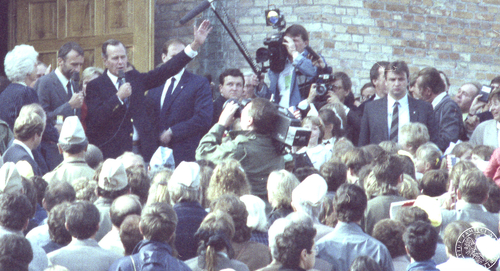
Crowd in front of St. Margaret the Virgin and Martyr church in Łomianki. Vice President George Bush delivers a speech. Operational photo of the Security Service. September 27, 1987 (Photo from the IPN collection)
Communist secret police against the Church in Poland
The Washington Post correspondent David Hoffman reported that Poles greeted Bush with an extraordinary outpouring of emotion, resulting in part from President Reagan’s strong stance against the suppression of Solidarity. The Washington Post correspondent also reported that because the official media of the Polish People’s Republic did not inform where Vice-President Bush might appear in public, representatives of the U.S. government ordered Voice of America to provide the program of his visit to Poland.8 I would describe this information from the American journalist as erroneous since I had not received these types of orders from anyone from Voice of America’s senior management, USIA, the State Department, or the White House. Acting on our own initiative, I and other VOA Polish Service editors included in our broadcasts programs of visits to the Polish People’s Republic of important figures from the United States, if we managed to obtain them since we knew that, in many cases, communist-controlled media in Poland would not provide such information to avoid spontaneous shows of support by ordinary Poles for American visitors.
The Washington Post correspondent correctly reported that many security service officers entered the crowd of people waiting for the arrival of the U.S. Vice President in Łomianki. Foreign correspondents observed two security agents practicing in broken English what to say if asked by American reporters, “What do you think of Bush’s visit”? To this question from one of the agents, the other replied: “Very good for [Polish-American] relations.” A report in Echo Tygodnia, a Polish news weekly in Toronto, Canada, said that several buses of security personnel arrived in Łomianki before the U.S. Vice President’s visit. 9
I discovered years later that the security service of the Polish People’s Republic was deeply dissatisfied with the reports and interviews I sent from Poland for Voice of America broadcasts. While receiving my journalist’s visa in Washington, I told a representative of the Polish People’s Republic Embassy, who was most likely an intelligence agent, that, according to my radio station’s charter, my news reports about Vice-President Bush’s visit to Poland would be objective. But, in a secret report prepared in 1987, now stored in the Institute for National Remembrance Archives, the security service expressed their deep dissatisfaction with my reporting from Poland:
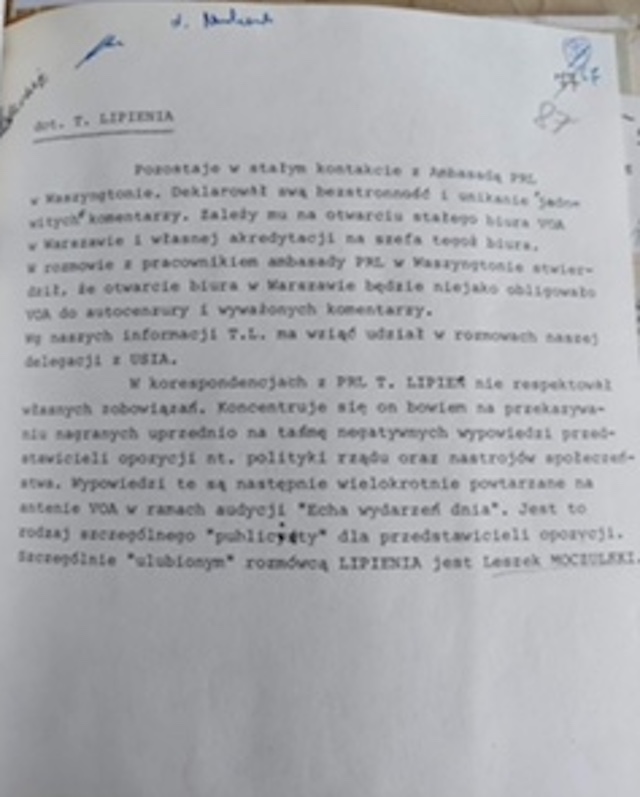
In reports from the Polish People’s Republic, T. LIPIEN did not respect his own obligations. They focused on transmitting previously recorded negative statements by representatives of the opposition regarding the government’s policy and public sentiment. These statements were then repeated many times by VOA as part of the “Echoes of the Day” [VOA Polish Service] program. This [he] is a special kind of “publicist” for the representatives of the opposition.
I saw my job primarily as providing factual information and opinions that were censored by the communist authorities. When I reported their statements, which were in many cases untrue and designed to cover up their failures, or conducted interviews with communist officials, I would challenge any false information that might have deceived our audience. 10 During the visit to the grave of Fr. Jerzy Popiełuszko by Vice-President Bush, I recorded and presented in the Voice of America report comments of the parents of the murdered chaplain of the Warsaw division of Solidarity, Marianna and Władysław Popiełuszko.
VOA interview with Vice President Bush
Together with VOA English Service correspondent Wayne Corey, I also recorded an interview with Vice President Bush in Washington shortly before he visited Poland. In it, he said that he would meet with Solidarity leaders, including Lech Wałęsa, and leaders of the Catholic Church.

A Voice of America Polish Service news item about Vice President George H. W. Bush’s interview in Washington for VOA before his visit to Poland in September 1987.
Bush in Kraków
The archives of the Cold War Radio Museum also include a recording of my report for Voice of America’s Polish Service about Vice President Bush’s stay in Krakow.
VOA interview with Lech Wałęsa
Despite being constantly followed by the secret police during my visit to Poland as a Voice of America correspondent in 1987, I travelled later to Gdansk and recorded an interview with Lech Wałęsa in the rectory of St. Bridget church, the Solidarity leader’s parish in his hometown. I took the recording back to Warsaw and sent it by phone to Washington to be broadcast the same evening. Lech Wałęsa, who openly demonstrated his deep religious faith, maintained close links with the Catholic clergy.
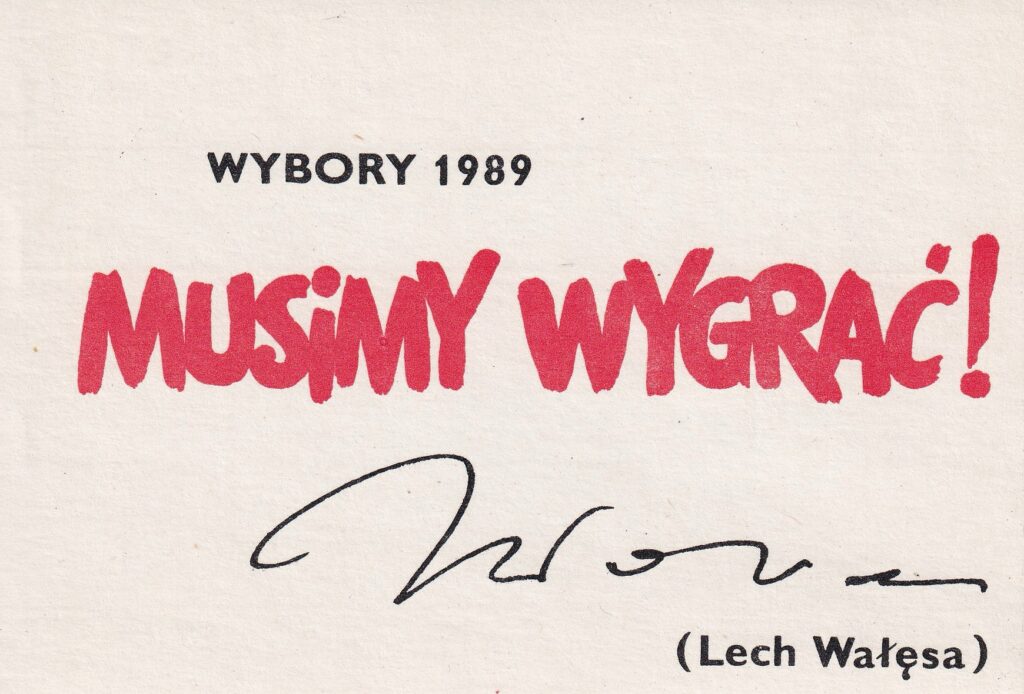
Lech Wałęsa’s slogan MUSIMY WYGRAĆ! (WE MUST WIN) for the partially free parliamentary elections in Poland in June 1989 won by candidates supported by Solidarity.
The Catholic Church’s support for the Solidarity pro-human rights movement ensured that the revolution from Communism to democracy in Poland was free from violence. The courage and determination of Poles to resist Communism was informed by the history of resistance against Nazi Germany and Soviet Russia and, to a large degree, by religion and strong ties to the Church. Partially free parliamentary elections in Poland in June 1989 led to the peaceful restoration of democracy, including fully free elections, free press, and complete independence from Soviet Russia. The victory of the people over the communist regime in Poland made the fall of the Berlin Wall possible a few months later. George H. W. Bush visited Poland again in July 1989, this time as president of the United States after winning the presidential elections in November 1988. In a few more years, Poland became a member of NATO and the European Union.
Reagan’s VOA Director Ken Tomlinson on importance of religious programs
The changes in Voice of America programming and the vast expansion of VOA’s Polish Service’s audience in Poland in the 1980s would not have been possible without President Reagan and the officials he put in charge of the United States Information Agency and VOA. Former Voice of America director and former Broadcasting Board of Governors (BBG) chairman Ken Tomlinson, who died in 2014, told the Voice of America in 2012 that his most memorable moment at VOA was to visit the Polish Service and helping arrange extensive news coverage of Pope John Paul II’s trip to Poland when the country was still under communist rule during the Cold War. The pope’s visits helped the suppressed Solidarity trade union to intensify its peaceful struggle for democracy, which eventually resulted in the fall of Communism. Father Stefan Filipowicz, a Chicago-based Jesuit priest and former director of the Polish Service at Vatican Radio, provided religious commentary from a VOA studio in Washington during the papal visit coverage. Live audio transmission from Poland was provided to VOA by Vatican Radio.
Ken Tomlinson and his wife Rebecca later traveled to Rome with me to meet Pope John Paul II. The Pope thanked the Voice of America for broadcasting news to his countrymen in Poland during Communism.
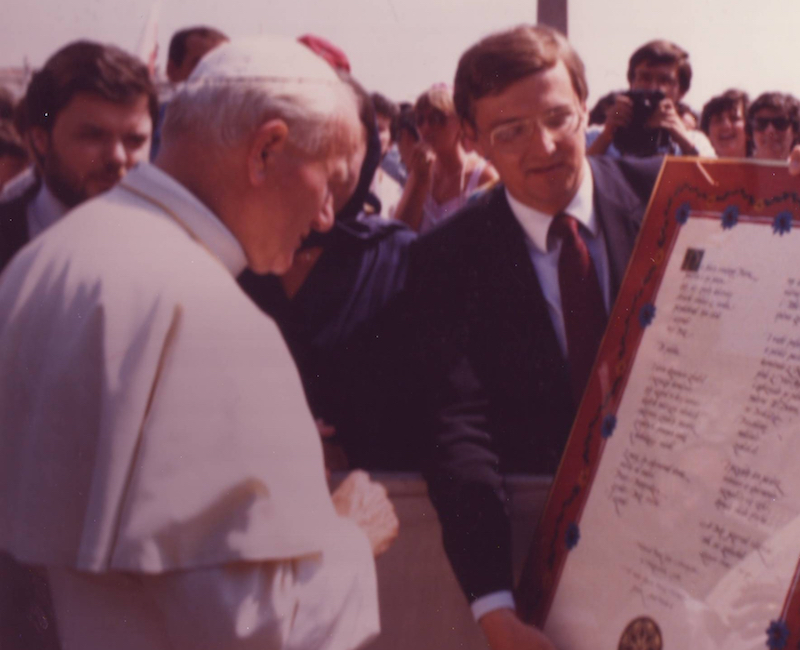
Pope John Paul II meets at the general audience in the Vatican (1980s) with Voice of America Director Kenneth Y. Tomlinson and the head of VOA’s Polish Section Tadeusz Lipień.
Thanks to Ken Tomlinson’s support, funding from the Reagan administration, and full bipartisan backing in the U.S. Congress, the Polish Service became one of the most successful language services in VOA’s history. According to a poll conducted by the Solidarity trade union, the Polish Service had over 70% weekly audience reach in Poland in the late 1980s. Surveys conducted among travelers from Eastern Europe by independent market research firms in Western Europe showed that VOA’s audience in Poland in the 1980s was between 40 and 50 percent.11
VOA editorial in defense of religious programming
At the beginning of the third year of Ronald Reagan’s presidency, the Voice of America aired a commentary defending the practice of broadcasting religious programs despite the separation of religion and state enshrined in the United States Constitution. Voice of America had previously broadcast religious programs but to a much smaller extent. The Reagan administration justified the increase of programs about religion as a response to the persecution of religious believers by some foreign governments. Although the authorities of the Polish People’s Republic did not prohibit religious practices, clergy and believers were exposed to discrimination in many areas of life due to their religious beliefs. The communist authorities in Poland often refused permission to build new churches, used censorship, and drastically limited the access of the Church and Catholic journalists to the mass media.
We at Voice of America have a responsibility to you, our listeners, that we take extremely seriously. It is to provide the most reliable and objective news of what is happening in the world. But we feel another responsibility that may not be so obvious. It is to make religious broadcasts available to people whose governments are actively trying to prevent them from practicing their faiths.
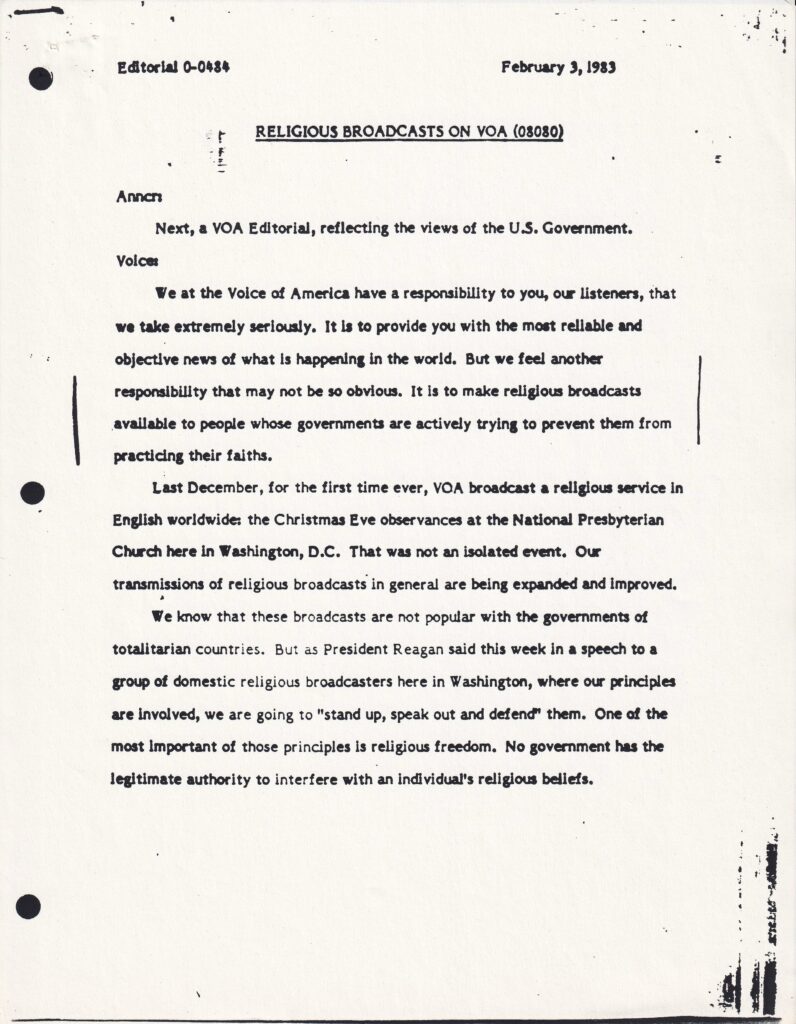
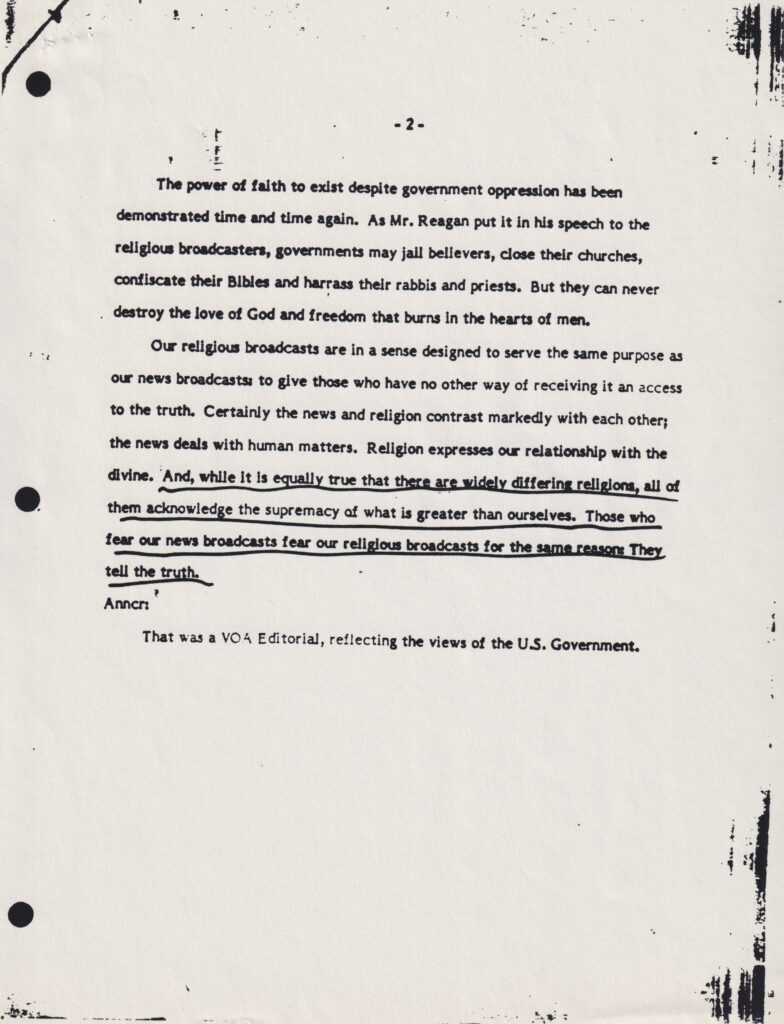
Voice of America editorial (February 3, 1983) on religious programs carried by the station during the presidency of Ronald Reagan.12
Left-leaning Democrat questions VOA’s religious programs
During the Cold War, some more left-leaning members of the Democratic Party in the United States Congress questioned the legality and advisability of Voice of America’s religious programs, thus lending support to Soviet bloc communist propaganda. In a letter in Voice of America director Gene Pell, dated January 3, 1986, Congressman Don Edwards (Democrat-California) wrote:
It has been brought to my attention that various Christian publications are reporting that your agency is broadcasting “Christian” messages to other countries. This, of course, would be a violation of VOA’s legislative mandate, as you know.13
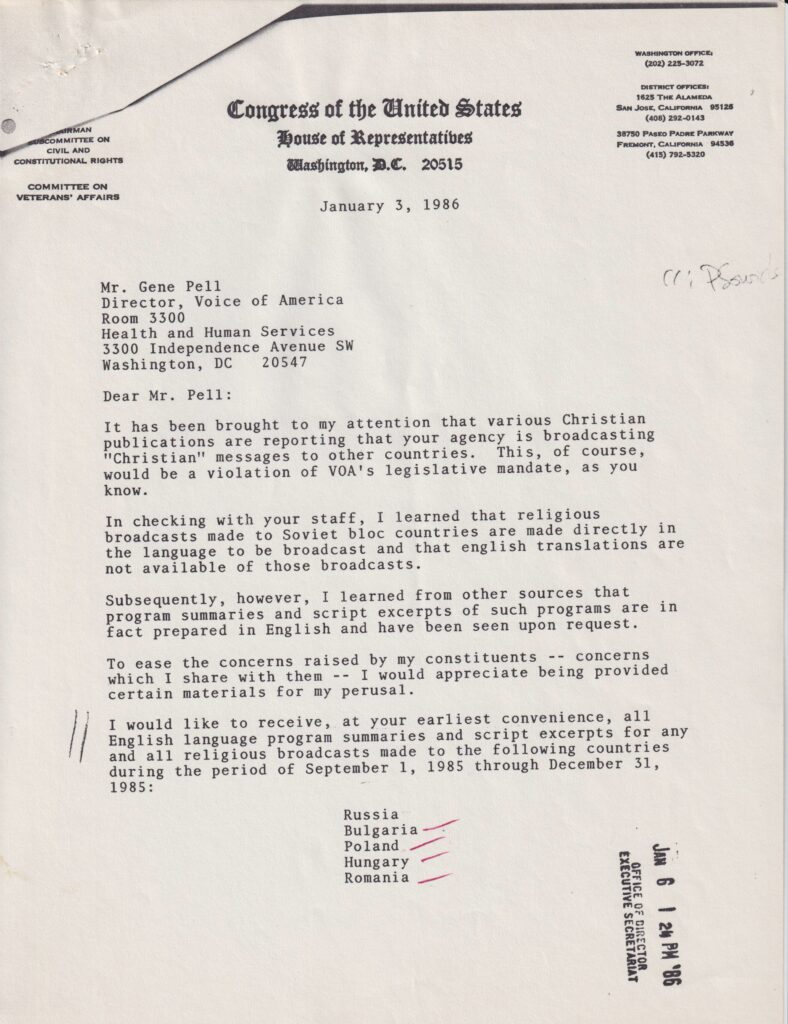
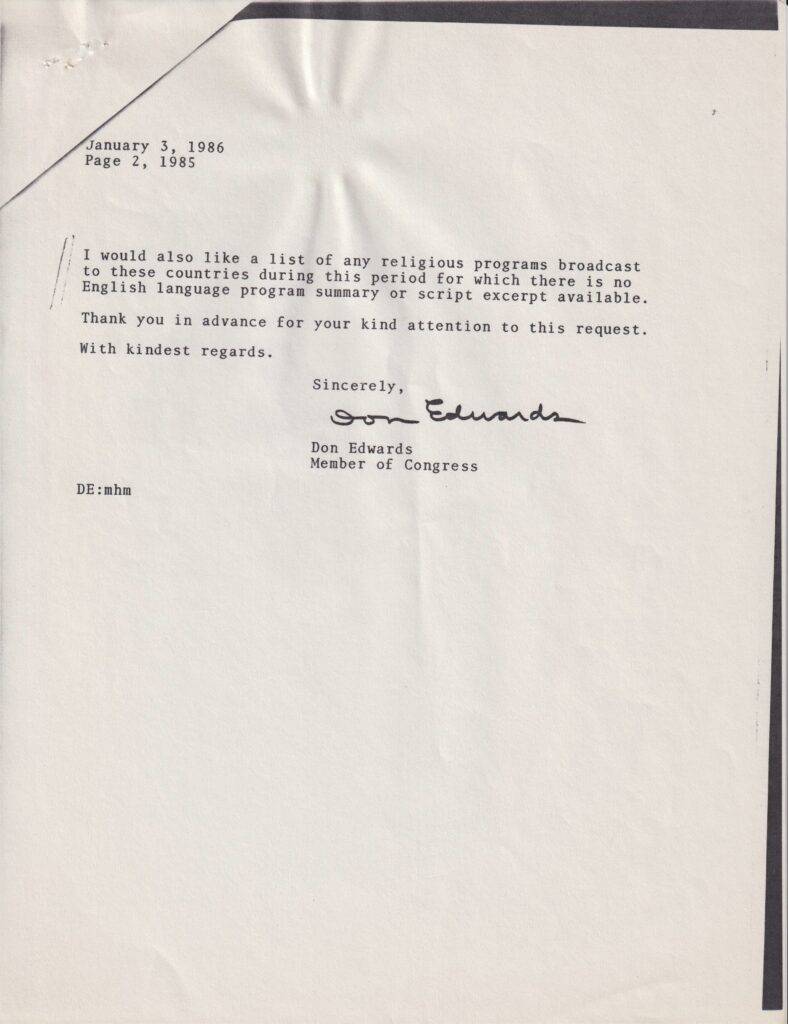
Director of Foreign Language Broadcasts, Pat Nieburg, responded in an internal memorandum that Voice of America’s “religious programs are intended to portray the diversity of U.S. life in the religious field.”14
Our religious programs are intended to portray the diversity of U.S. life in the religious field. It also stresses the religious freedom which exists in the U.S. Thus, our broadcasts touch on a significant aspect of our constitutionally guaranteed rights.15
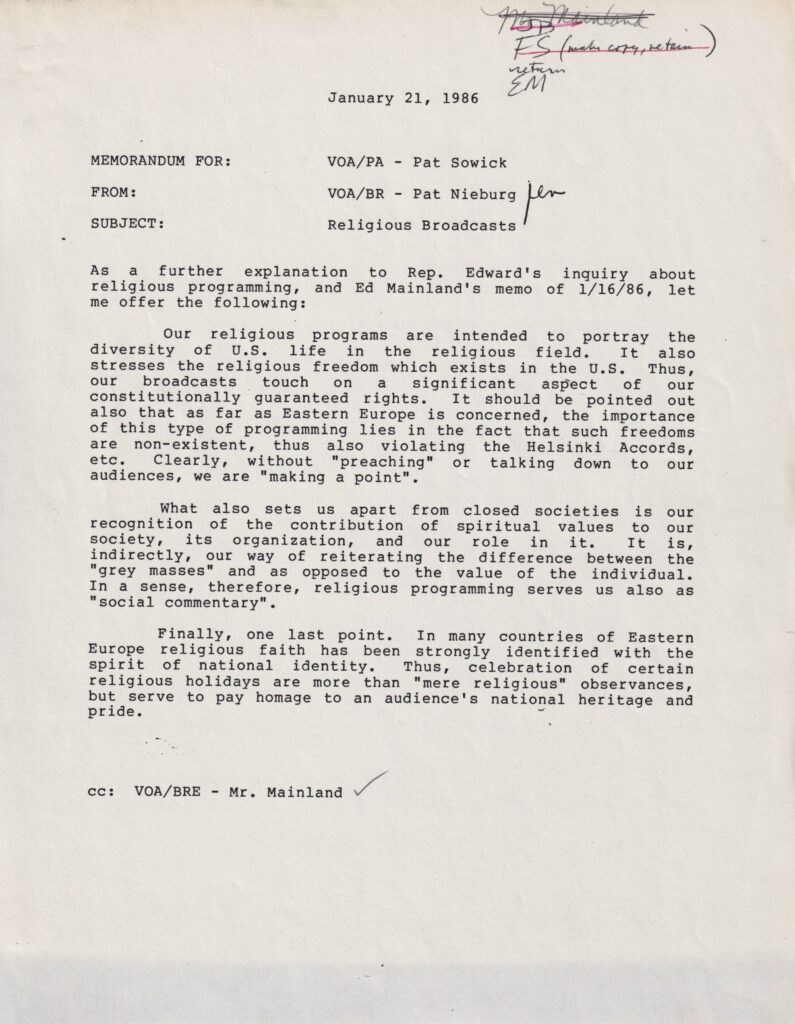
Two years later, Voice of America director Robert Barry declared, “We do not propagate faith …. we report on it as part of American life.16
The U.S. Constitution prohibits state support of religion. Still, the Supreme Court, which banned student prayers in public schools, has never ruled on broadcasting tax-funded religious programs intended for foreign audiences in countries without religious freedom. The United States House of Representatives and the Senate elect and employ chaplains who begin each day’s proceedings with prayers. The Supreme Court ruled that this practice, rooted in history and tradition, does not violate the Constitution. The U.S. armed forces also employ chaplains.
Catholic Church in Poland under Communism
The Church, the only important national institution in Poland that the authorities could not dominate, was a counterweight to the indoctrination carried out by the regime’s media. The Polish Primate, Cardinal Stefan Wyszyński, with the support of the entire episcopate, opposed the communization of the country, choosing at the same time the path of tactical compromises in relations with the authorities of the Polish People’s Republic in order to protect society and the Church against the most dangerous effects of the new system, including the threat of military intervention by the USSR.
No one in the Polish People’s Republic had full freedom of speech. The only things that were not subject to censorship were the voices reaching Poland from the West, including statements of writers, opposition activists, bishops and priests in Poland sent to the West and transmitted, often anonymously, back to the country on the radio waves – until Reagan’s presidency mainly through Radio Free Europe; much less in the Voice of America broadcasts – or in the publications of the Paris-based Polish-émigré literary-political magazine Kultura.
Pope John Paul II certainly accelerated the fall of communism in his homeland more than anyone else, but as the Archbishop of Krakow, Cardinal Karol Wojtyła also could not publicly express everything he knew and would like to say about communism, the Soviet Union or the Katyn massacre, as this could be done in exile by journalists from Radio Free Europe and, before President Reagan’s administration took power, only to a certain extent by the Polish Service of Voice of America. Until the start of the Reagan administration in 1981, the Voice of America management either accepted and promoted the Soviet propaganda lies about the Katyn massacre or practiced censorship and limited coverage on this topic to hide or obscure the Soviet responsibility for murdering in 1940 nearly 22,000 Polish military officers, government employees, and intellectual leaders in Soviet captivity. Radio Free Europe never censored information about the Katyn massacre. For decades, Soviet leaders and propagandists falsely tired to blame Nazi Germany for this genocidal war crime. Among the thousands of Polish citizens secretly murdered by the Soviet NKVD secret police in April and May 1940 were over 30 members of the clergy, including the chief rabbi of the Polish Army, Major Baruch Steinberg.
Even though Cardinal Wojtyła often courageously raised topics in his sermons that were inconvenient for the authorities, even later as Pope he had to formulate them with great caution so as not to expose the Church and the faithful to additional repressions. Clergy such as Fr. Jerzy Popiełuszko, who particularly offended the authorities of the Polish People’s Republic with his pastoral activities and criticism of communist materialism, were exposed to harassment and even death. During the Stalinist period, the communist authorities imprisoned Poland’s Primate, Cardinal Stefan Wyszyński, Bishop Czesław Kaczmarek, and some priests. They were released after anti-regime protests in 1956, but repressions against the Church and discrimination of religious believers did not stop completely until the fall of Communism in Poland.
Voice of America Polish Service’s 1976 interview with Cardinal Wojtyła, future Pope John Paul II
When in August 1976, Cardinal Karol Wojtyła, then Metropolitan of Krakow, gave an interview to the Polish Service of Voice of America in Washington during his visit to the United States, he had to carefully weigh his words so as not to expose the Church in Poland to repression from the authorities, but despite this, he was able to include an appeal for freedom of speech in his answers, talking about the hunger for freedom and the hunger for truth.17 VOA’s Polish Service repeated the interview on October 16, 1978, on the day of Cardinal Wojtyła’s election to the See of Peter. The interview was conducted by Tadeusz Lipień, the future head of the Polish Service of Voice of America.
Together with this basic hunger– if one could use this expression — go other types of hungers of today’s Man, equally great and equally deeply felt by various societies, by different groups, and finally by individuals. The organizers of the Congress rightly included in its program such themes as: “The Hunger for Liberty, “The Hunger for Truth,” “The Hunger for Understanding,” “The Hunger for Love.”To all of these hungers of today’s Man, the Eucharist provides a final dimension: Man hungers for God. His heart is unsettled without him.
VOA coverage of 1979 papal mass in Washington
Already during the first visit of Pope John Paul II to the United States, the Polish Service of the Voice of America obtained from Carter administration officials a rare permission at that time to temporarily expand its short regular program and transmit a full live broadcast of the Catholic mass celebrated by the pontiff on Washington’s National Mall on October 7, 1979. The mass was also broadcast live by Radio Free Europe’s Polish Service. I reported live from the Mall for VOA’s Polish Service.
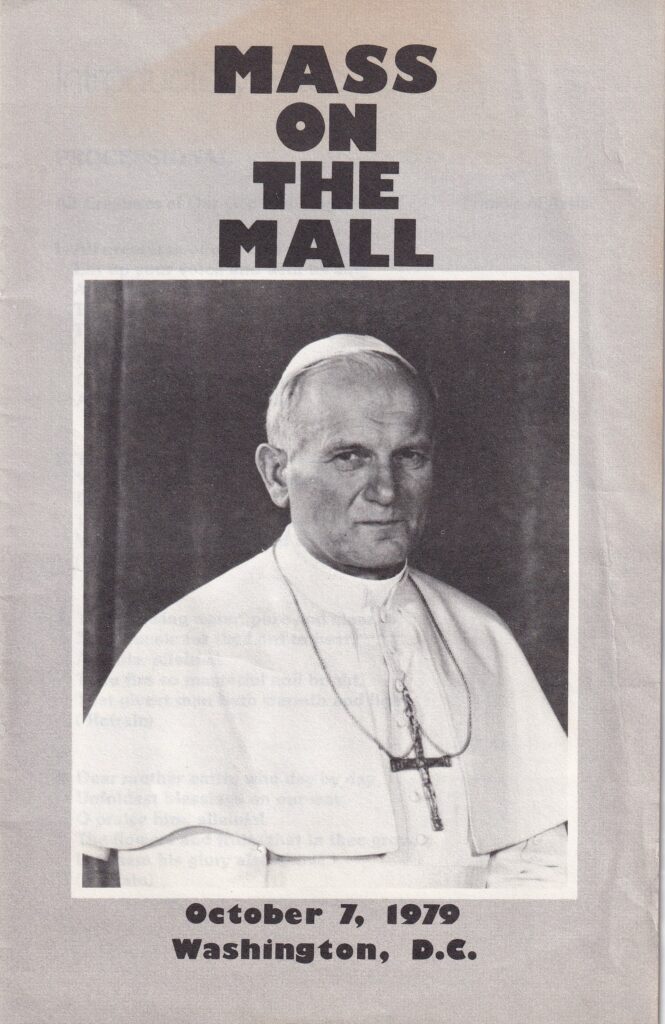
Cover of the program for the mass celebrated by Pope John Paul II on the National Mall in Washington, D.C., October 7, 1979. The mass was transmitted live to Poland by Voice of America’s Polish Service. VOA Polish Service broadcaster Ted (Tadeusz) Lipień, who later became Polish Service chief and acting VOA Associate Director in charge of English programs, provided live reporting from the Mall.
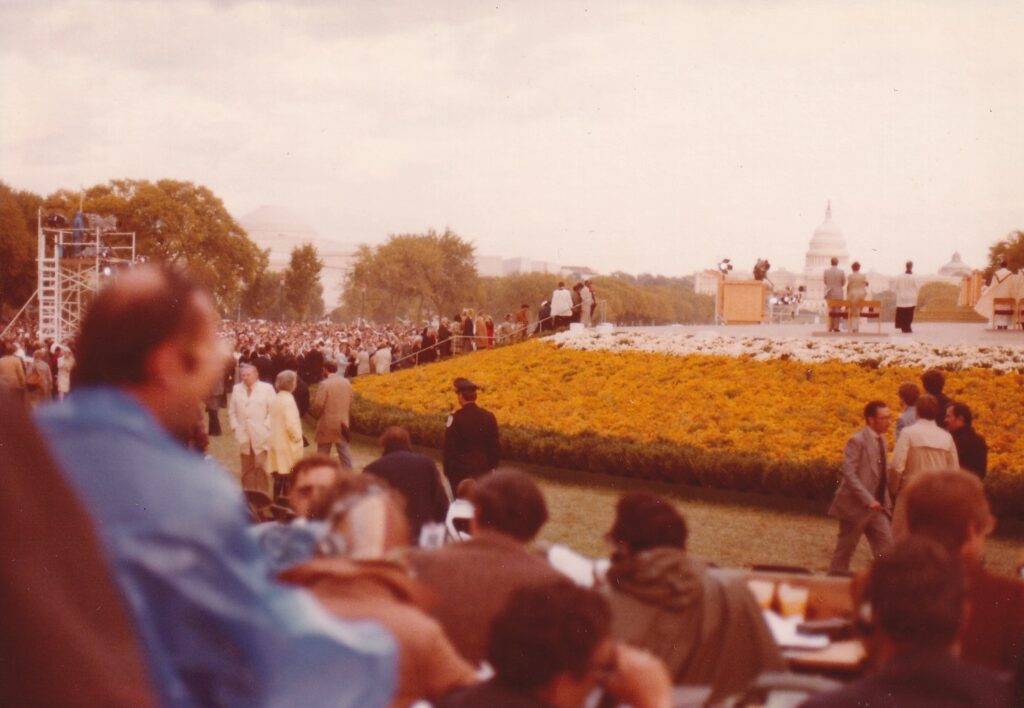
Altar on Washington’s National Mall before John Paul II’s mass on October 7, 1979. (Photo by Voice of America reporter and future VOA Polish Service chief Tadeusz Lipień)
When the authorities of the Polish People’s Republic suspended broadcasts of Sunday masses on Polish Radio after the introduction of martial law in December 1981, VOA’s Polish Service began broadcasting Catholic masses from the church of the Polish-American parish in the suburbs of Washington. These transmissions stopped when Polish Radio resumed its broadcasts of Sunday mass.
VOA’s religious programs to the Soviet Union
Religious programs in the Polish Service of the Voice of America were increased during Ronald Reagan’s presidency, shortly after the declaration of martial law in Poland. Even before the establishment of the Polish Solidarity independent trade union in 1980, VOA’s Russian Service paid somewhat more attention to religious programs than the Polish Service. Persecution of religion in Soviet Russia was much stronger than in Poland, and, unlike in Poland, the hierarchy of the Orthodox Church in the Soviet Union was entirely controlled by the KGB secret police.
Little has been written about VOA’s religious programming in the more than 80 years of the station’s existence, but a new book titled Cold War Radio: The Russian Broadcasts of the Voice of America and Radio Free Europe/Radio Liberty written by Mark G. Pomar, former director of the USSR branch of the Voice of America, has a chapter on religious programming on VOA and Radio Liberty.
In the 1970s, VOA’s Russian Service hired a young U.S.-educated Orthodox priest, the Reverend Victor Potapov, from a Russian-American church in Washington, D.C. As reported in his book by Mark Pomar, after VOA’s management’s initial skepticism about his appointment, Father Victor eventually was put in charge of a forty-five-minute religious program, Religion in Our Life. Another VOA Russian Service broadcaster, a Jewish émigré writer Vladimir Matlin, was in charge of a program for both religious and non-religious Jews in the Soviet Union.
Pomar writes in his book about the strong support of Kenneth Tomlinson, the VOA director appointed by President Reagan, for proposals to expand the religious programming of the Russian Service in the 1980s.
Early in my tenure at VOA, I met regularly with the director, Kenneth Tomlinson, to discuss the overall strategic approach of the Russian broadcasts …. Prominent on our agenda was the subject of religion. Tomlinson told me that the [Reagan] White House and the NSC [National Security Council] were keenly interested in how VOA treated religion.18
Tomlinson and his successors as VOA directors during the Reagan administration, Gene Pell and Richard Carlson, supported similar proposals to increase the Polish Service’s religious programs and made funds available to provide more information about Pope John Paul II’s role in the struggle for religious freedom and other human rights.
Full cassette recordings of Vice President Bush’s visit to Łomianki and Kiełpin, September 27, 1987
Complete cassette recordings made VOA Polish Service reporter and chief Ted (Tadeusz) Lipień during the visit of Vice President George H. W. Bush to Łomianki and Kiełpin, Poland, on September 27, 1987. The Polish Service of Voice of America broadcast segments of these recordings in reports sent by its reporter.
NOTES:
- International Communication Agency, “The Voice of America,” circa early 1981.
- The New York Times, “The Polish Pope in Poland,” June 5, 1979, p. A20, https://timesmachine.nytimes.com/timesmachine/1979/06/05/111714326.html?pageNumber=20.
- For an analysis of the history-changing nature of the papal visit to Poland in 1979 and the New York Times editorial see George Weigel’s column in Denver Catholic, June 5, 2024, “Aroused consciences changing history,” https://denvercatholic.org/aroused-consciences-changing-history/. The Washington Post, in its editorial on June 3, 1979, had a more accurate assessment of the Pope’s visit while also giving credit to Polish Communist Party leader Edward Gierek: “Despite his effort to stay within the bounds – to him the broad bounds – of the religious sphere, the emotions he has let loose are evident in the size and fervor of the crowds he is drawing, and there could yet be an explosion. The fragility of the Communist order in Poland, elsewhere in Eastern Europe and even, to an extent harder to express (and therefore to measure), in the Soviet Union itself, is a political fact. What John Paul II, self-styled “Slav pope,) yesterday called ‘the spiritual unity of Christian Europe’ is also a political fact. This puts a heavy responsibility on John Paul II and, in this instance, on Communist party leader Edward Gierek, a figure sensitive in his own way to both the constraints on Poland and the aspirations of Poles.” The Washington Post, “The Pope’s Pilgrimage,” June 3, 1979, https://www.washingtonpost.com/archive/politics/1979/06/04/the-popes-pilgrimage/ff5f37ce-5ca4-42fa-9c01-af7c06caaafb/.
- In the 1940s, Voice of America was dominated by Socialists, Communists, and Soviet sympathizers who ignored repression of religion in Soviet bloc countries. The first VOA chief news editor and writer (in 1943) was Howard Fast, author of popular history novels, Communist Party USA activist, and the Stalin Peace Prize winner in 1953. At the end of President Truman’s administration and during President Eisenhower’s administration, the Voice of America changed its approach towards Russia and became interested in religious persecution and other human rights violations in countries behind the Iron Curtain, but during the period of détente in relations with Moscow and the Soviet Bloc countries the 1960s and 1970s, VOA’s Polish Service had only one weekly religious program a few minutes long. Political activist, scientist, journalist and writer Bertram D. Wolfe, one of the founders of the Communist Party USA, who later broke with Communism and whom Voice of America hired in the early 1950s, found that the English-language writers of the Voice of America broadcasts were unable to write convincingly about religion in communist-ruled countries. Wolfe, who was an atheist, stated that journalists on the English-language section of the Voice of America in the early 1950s lacked the appropriate education and experience to write about the Soviet Union and other communist bloc countries, especially on topics related to religion. He mentioned this in his autobiography A Life in Two Centuries, published posthumously in 1981:
When I went to work for the Voice of America in the period from 1950 to 1954, religious leaders and believers were being framed, tortured, and sent to concentration camps in all the countries under Communist rule in Eastern Europe. After trying to get my script writers to write effective radio broadcasts to defend the religious freedom of the churchmen and devout believers who were being thus persecuted, I found that I had to write the scripts myself to get the requisite feeling into them. I did not believe what the persecuted believed, but I did believe in their right to freedom to harbor and practice their beliefs without interference. Bertram D. Wolfe, A Life in Two Centuries: An Autobiography (New York: Stein and Day, 1981), p. 81. Religious programs in the Polish Service of the Voice of America were increased only during the presidency of Ronald Reagan, shortly after the declaration of martial law in Poland.
- American War Memorials Overseas, Inc., B-17 43-38175 (I’ll Be Seeing You) Memorial, https://www.uswarmemorials.org/html/monument_details.php?SiteID=2728&MemID=3583. lomianki.info, „Był Bush, był Gore, przyjedzie Obama?”, 26 kwiecień 2011 r, https://lomianki.info/byl-bush-byl-gore-przyjedzie-obama/.
- United Press International, UPI Archives, Polish TV viewers moved by Bush speech, 28 wrzesień 1987 r., https://www.upi.com/Archives/1987/09/28/Polish-TV-viewers-moved-by-Bush-speech/6848559800000/.
- Radosław Morawski, Przystanek Historia, „A ground-breaking visit, or a visit of ground-breaking times?”, 09.07.2020, https://przystanekhistoria.pl/pa2/tematy/english-content/71061,A-ground-breaking-visit-or-a-visit-of-ground-breaking-times.html.
- David Hoffman, The Washington Post, „Chanting Polish Crowds Provide Bush with Footage for ’88 Campaign”, https://www.washingtonpost.com/archive/politics/1987/10/04/chanting-polish-crowds-provide-bush-with-footage-for-88-campaign/4797c647-9c50-4b4b-a48d-9ebbcf5279b9/.
- Echo Tygodnia, Toronto, Wiceprezydent USA w Polsce spotkał się z Wałęsą, October 1-7, 1987, p. 5.
- In their secret report, the security service in Poland incorrectly described my contacts with the Polish People’s Republic Embassy in Washington as frequent and mistakenly thought I wanted to become a Voice of America correspondent in Warsaw. My few visits to the Polish People’s Republic consulate in Washington, which I reported, as required, to my government agency’s security office, were for the purpose of obtaining journalistic visas for myself and other Voice of America employees. The security service also incorrectly reported that my “favorite” interlocutor in Poland was Leszek Moczulski. I recorded only one interview with Moczulski in Warsaw but also conducted many interviews with other, better-known and more influential opposition activists, including Lech Wałęsa (future President of Poland), Zbigniew Bujak (future member of Parliament), Jacek Kuroń (future member of Parliament and Minister of Labor), Jan Józef Lipski (future Senator), Bronisław Geremek (future Minister of Foreign Affairs) and Janusz Onyszkiewicz (future Defense Minister). Most of the Polish opposition activists interviewed during the Solidarity period in Poland in the 1980s later held important political positions in the democratically-elected Polish governments after the fall of Communism.
- A. Ross Johnson and R. Eugene Parta, “Cold War International Broadcasting: Lessons Learned,” presented during a seminar, “Communicating with the Islamic World”, Annenberg Foundation Trust, Rancho Mirage, California, February 5, 2005 .
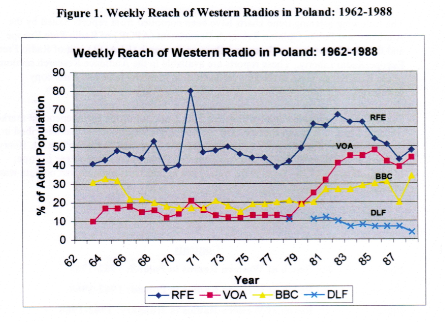
- Voice of America editorials, consulted with the U.S. Department of State and written in English, were obligatorily translated and broadcast by all language services. Due to the requirement to broadcast them and the official, stiff tone, they did not enjoy a good reputation among most Voice of America journalists, even among those who generally agreed with the opinions expressed in these VOA editorials.
- Don Edwards, U.S. House of Representatives, Letter to Gene Pell, Director, Voice of America, January 3, 1986, Cold War Radio Museum Archive.
- Pat Nieburg, Voice of America Memorandum to Pat Sowick: “Religious Broadcasts,” January 21, 1986, Cold War Radio Museum Archive.
- Ibid.
- Jack Anderson and Joseph Spear, “Soviets Tune In to VOA for Religion, The Washington Post, January 11, 1988, p. 11.
- “The Eucharist and the Aspirations of the Human Family” was the official theme of the 41st International Eucharistic Congress in Philadelphia, August 1-8, 1976. Cardinal Wojtyła attended the Eucharistic Congress in Philadelphia.
- Mark G. Pomar, Cold War Radio: The Russian Broadcasts of the Voice of America and Radio Free Europe/Radio Liberty (Lincoln: Potomac Books, an imprint of the University of Nebraska Press, 2022), p. 183.


